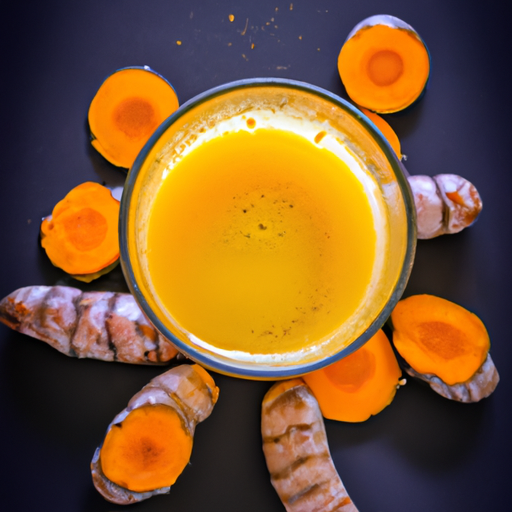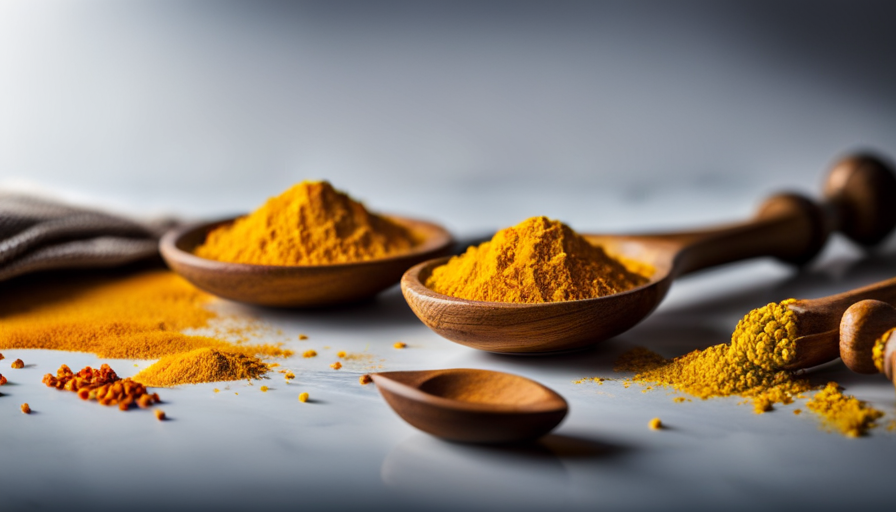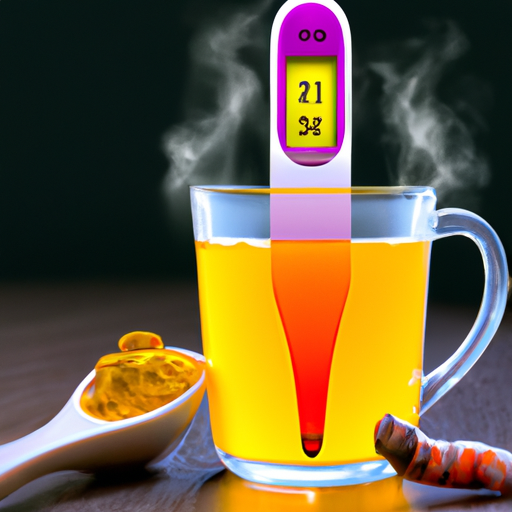As a person who appreciates the health advantages of herbal teas, I frequently make a pot of ginger turmeric tea. This calming and zesty beverage is renowned for its anti-inflammatory qualities, immune-boosting capabilities, and digestive assistance.
However, like all food and drinks, it has a shelf life. So how long can you keep ginger turmeric tea before it goes bad?
In this article, we’ll explore the factors that affect the shelf life of ginger turmeric tea, including how to tell when it’s gone bad. We’ll also discuss tips for storing and reheating the tea so that you can enjoy its flavor and benefits for as long as possible. Additionally, we’ll cover other uses for ginger turmeric tea beyond just drinking it and any precautions or side effects to be aware of.
Finally, we’ll provide a simple recipe so you can make your own batch at home. Let’s dive in!
Key Takeaways
- The shelf life of ginger turmeric tea can be affected by temperature, light, and moisture, so it is important to store it in a cool, dry place away from sunlight in an airtight container.
- Signs of spoilage include a sour or musty smell and a bland taste. If stored properly, the tea can last up to 5 days in the fridge in an airtight container.
- Pre-packaged tea has a shelf life of 18 months.
- In addition to being a delicious and healthy beverage, ginger turmeric tea can also be used as a hair rinse, bathwater soak, or cooking ingredient.
Benefits of Ginger Turmeric Tea
You’ll love how sipping on a warm cup of ginger turmeric tea not only tastes delicious, but also delivers powerful anti-inflammatory benefits to your body. Ginger has long been known for its medicinal properties, including reducing nausea and inflammation. Turmeric, on the other hand, contains curcumin which is a potent antioxidant that helps fight against chronic diseases such as heart disease and cancer.
Health benefits aside, ginger turmeric tea is incredibly easy to make and can be enjoyed any time of day. Simply steep fresh ginger and turmeric root in hot water for about 10 minutes before straining it and adding honey or lemon juice to taste. It’s perfect for those who want to incorporate more natural remedies into their daily routine or are looking for a caffeine-free alternative to traditional teas.
Now let’s move onto the factors affecting the shelf life of this delicious beverage.
Factors Affecting Shelf Life
Factors can greatly impact the shelf life of homemade herbal teas, and ginger turmeric tea is no exception. The main factors that affect the shelf life of this tea are storage conditions, such as temperature, exposure to light, and moisture. If not stored properly, ginger turmeric tea may go bad faster than expected.
To ensure that your homemade ginger turmeric tea lasts longer, it’s essential to store it in a cool and dry place away from direct sunlight. A pantry or cupboard would be an ideal spot for storing this type of tea. Also, make sure to use an airtight container to prevent air and moisture from affecting the quality of the tea.
By following these simple tips on storage conditions, you can extend the shelf life of your ginger turmeric tea. Knowing how long ginger turmeric tea stays good will help you avoid drinking expired or spoiled tea.
In the next section, we will discuss some signs that indicate when ginger turmeric tea has gone bad without compromising your health or well-being.
Signs That Ginger Turmeric Tea Has Gone Bad
If your senses detect a sour or musty smell emanating from the tea bag, it may be time to dispose of it. This is one of the most common signs that ginger turmeric tea has gone bad.
Another sign is if the tea tastes bland or has lost its potency. If you notice any of these signs, it’s best to avoid consuming the tea as it could cause stomach problems.
However, just because your ginger turmeric tea has gone bad doesn’t mean that you have to throw it away. There are ways to repurpose old ginger turmeric tea such as using it as a hair rinse or adding it to your bathwater for a relaxing soak.
Additionally, if you’re unsure about whether your ginger turmeric tea is still potent, try brewing a small cup and tasting it before making a larger batch. By following these tips, you can make sure that your ginger turmeric tea stays fresh and potent for longer periods of time.
As we move on to the next section about how long does ginger turmeric tea stay good, let’s explore more ways in which we can keep our teas fresh and potent for longer durations.
How Long Does Ginger Turmeric Tea Stay Good?
Wondering how fresh your ginger turmeric tea is? It’s important to know the shelf life of this powerful beverage to ensure it still packs a punch.
Ginger turmeric tea can stay good for up to five days if stored in an airtight container in the fridge. However, it may lose some of its potency over time and become less effective.
It’s also important to check the expiration date on any pre-packaged ginger turmeric tea you purchase. Most brands have a shelf life of around 18 months from the date they were packaged.
To get the most out of your ginger turmeric tea, make sure you consume it before it expires or loses its effectiveness. Now that we know how long ginger turmeric tea stays good for, let’s talk about some tips for storing it properly.
Tips for Storing Ginger Turmeric Tea
To keep your ginger turmeric tea potent and fresh, try storing it in an airtight container in the fridge. This will help to preserve its flavor and aroma for a longer period of time. Tea storage is crucial as it affects the shelf life of your beverage.
When stored properly, ginger turmeric tea can last up to 5 days in the fridge. When storing your tea, make sure that the container you use is completely airtight. Oxygen exposure can cause oxidation which leads to loss of freshness and potency.
Additionally, avoid storing your tea near foods with strong odors as this can affect its taste. By following these simple tips for tea storage, you’ll be able to enjoy a cup of fresh-tasting ginger turmeric tea whenever you want without worrying about it going bad.
Now that we’ve covered how to store ginger turmeric tea properly, let’s move on to how to reheat it without losing any flavor or nutrients.
How to Reheat Ginger Turmeric Tea
When reheating your flavorful and aromatic ginger turmeric tea, simply pour it into a small pot and warm it up over low heat. This will help preserve the flavors of the tea while ensuring that it is heated to your desired temperature. However, there are other reheating methods you can use for different flavor variations.
For example, if you want a stronger ginger flavor in your tea, you can grate some fresh ginger root and add it to the pot along with the reheated tea. On the other hand, if you want a milder taste, you can dilute the tea with some hot water before reheating it. These simple adjustments can make all the difference in how your ginger turmeric tea tastes when reheated. Now that we’ve covered how to reheat this delicious drink let’s explore other uses for ginger turmeric tea.
Other Uses for Ginger Turmeric Tea
If you’re feeling under the weather, sipping on a cup of ginger turmeric tea is like wrapping yourself in a warm blanket on a chilly day. But did you know that this delicious tea has other health benefits besides being a natural remedy for cold and flu symptoms?
Ginger contains compounds that have anti-inflammatory properties, which can help alleviate pain caused by arthritis and menstrual cramps. Turmeric, on the other hand, contains curcumin which is known for its antioxidant properties that protect against cell damage.
Aside from its medicinal uses, ginger turmeric tea can also be used in cooking. The combination of spicy ginger and earthy turmeric makes it a great addition to soups, stews, and even smoothies. Its unique flavor profile adds depth and complexity to dishes without overpowering other ingredients.
So next time you’re not feeling well or just want to experiment with new flavors in your cooking, reach for some ginger turmeric tea! And speaking of precautions and side effects…
Precautions and Side Effects
As I continue to explore the benefits of ginger turmeric tea, it’s important to also discuss precautions and potential side effects.
For individuals with allergies, it’s important to note that both ginger and turmeric can cause allergic reactions in some people.
Additionally, ginger can interact with certain medications such as blood thinners and diabetes medications.
Finally, pregnant and breastfeeding women should consult with their healthcare provider before consuming large amounts of these herbs.
It’s always better to err on the side of caution when it comes to incorporating new supplements into your routine.
Allergies
You’ll want to make sure that you don’t experience any allergic reactions after drinking ginger turmeric tea, so pay attention to any itching or swelling sensations in your throat or mouth. Allergies are a potential risk when consuming this type of tea, but it’s important to remember that they’re rare and most people can enjoy the health benefits of ginger turmeric tea without any adverse effects.
To avoid experiencing an allergic reaction, consider the following precautions:
- Start with a small amount of ginger turmeric tea and gradually increase your intake.
- If you have a known allergy to either ginger or turmeric, avoid drinking the tea altogether.
- Consult with your healthcare provider if you have any concerns about allergies or interactions with medications.
- Store leftover ginger turmeric tea in the refrigerator for no longer than 24 hours to prevent spoilage.
It’s important to be aware of potential allergies when consuming ginger turmeric tea, but by taking these simple precautions, you can enjoy its many health benefits safely.
Speaking of safety, let’s now discuss how this powerful herbal mixture could interact with certain medications.
Interactions with Medications
Be mindful of potential interactions between medications and this powerful herbal mixture, as it could have unexpected and harmful effects on your health. Ginger turmeric tea has been known to interact with certain drugs such as blood thinners, diabetes medications, and high blood pressure medications. If you’re taking any of these medications, it’s important to consult with your healthcare provider before consuming ginger turmeric tea.
Additionally, dosage recommendations should be followed closely when consuming ginger turmeric tea. While this herbal mixture has many health benefits, too much of it can cause adverse effects such as upset stomach or diarrhea. It’s recommended to consume no more than 4 grams of ginger per day and no more than 1-3 grams of turmeric per day.
With proper care and attention to drug interactions and dosage recommendations, ginger turmeric tea can be a safe addition to a healthy lifestyle.
Transitioning into the subsequent section about pregnancy and breastfeeding, it’s important to note that pregnant women or nursing mothers should also consult with their healthcare provider before consuming ginger turmeric tea due to potential risks for both mother and child.
Pregnancy and Breastfeeding
If you’re expecting or nursing, it’s essential to consult with your healthcare provider before incorporating ginger turmeric tea into your diet. While ginger turmeric tea has many potential health benefits, there are some concerns about its safety during pregnancy and breastfeeding. Some studies suggest that ginger may help alleviate morning sickness, but the evidence is not yet conclusive.
Additionally, turmeric may have blood-thinning effects that could be a concern during pregnancy or when breastfeeding. It’s important to discuss any potential risks or benefits of consuming ginger turmeric tea with your healthcare provider before adding it to your routine. That being said, some women find that drinking this tea can be helpful for postpartum recovery due to its anti-inflammatory properties.
Now let’s move on to discussing how you can make homemade ginger turmeric tea!
Homemade Ginger Turmeric Tea Recipe
Combining fresh ginger and turmeric roots with boiling water creates a flavorful homemade ginger turmeric tea. Allow the mixture to steep for 10-15 minutes for best results. This tea can last up to five days in the refrigerator.
Ginger and turmeric have been known for their health benefits for centuries. Ginger has anti-inflammatory properties that can help reduce muscle pain and soreness. Turmeric is a powerful antioxidant that helps protect cells from damage caused by free radicals.
There are many variations of ginger turmeric tea recipe out there, but the basic ingredients remain the same: fresh ginger root, fresh turmeric root, and boiling water. Some people add honey or lemon juice to enhance the flavor and reap additional health benefits. Others add cinnamon or black pepper to increase the bioavailability of curcumin in turmeric.
Regardless of how you make your ginger turmeric tea, be sure to store it properly in an airtight container. Consume it within five days to ensure its freshness and potency.
Frequently Asked Questions
Can ginger turmeric tea be stored in the freezer for a longer shelf life?
Yes, you can freeze ginger turmeric tea for a longer shelf life. However, keep in mind that freezing may alter the flavor of the tea. It’s best to consume it within 3-6 months for optimal taste and health benefits.
Can ginger turmeric tea be consumed past its expiration date if it has been stored properly?
Although ginger turmeric tea has a shelf life, it can still be safe to consume past its expiration date if stored properly. Storing tips include keeping it in an airtight container and refrigerated. Always trust your senses before drinking.
Can ginger turmeric tea be consumed by pregnant women or individuals with certain health conditions?
As a medical AI, I recommend consulting with a healthcare provider before consuming ginger turmeric tea during pregnancy or if you have any health conditions. Some ingredients in the tea may interact with certain medications or exacerbate existing conditions.
Is it safe to consume ginger turmeric tea if it has a slightly different taste or color than normal?
Feeling hesitant about the taste or color of ginger turmeric tea? Don’t worry! As long as it’s made with fresh ingredients, it’s safe to consume. Alternative recipes offer varied health benefits.
Can ginger turmeric tea be used topically for skin or hair care purposes?
Ginger turmeric tea can be used topically for skin or hair care purposes. Its anti-inflammatory and antioxidant properties can help improve skin texture and reduce hair fall. Topical uses of ginger turmeric tea have several benefits for overall wellness.
Conclusion
Well, folks, it looks like we’ve come to the end of our journey. We’ve learned about the amazing benefits of ginger turmeric tea and how to properly store and reheat it.
We also discussed the signs that indicate when your tea has gone bad and some precautions you should take before consuming it. But let me tell you, this isn’t just any old cup of tea.
Ginger turmeric tea is a powerful elixir that can help boost your immune system, reduce inflammation, aid digestion, and so much more. So don’t let its shelf life limit your enjoyment of this magical drink.
Just remember to store it properly and keep an eye out for any signs of spoilage. In conclusion, ginger turmeric tea is not only good for you but also delicious!
It’s a versatile beverage that can be enjoyed hot or cold and even used in cooking or baking. So go ahead, brew yourself a cup and savor all the amazing health benefits it has to offer. Cheers!










